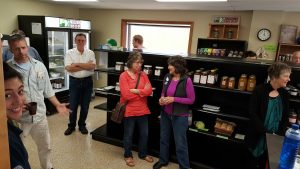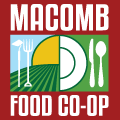Why we chose the co-op model
 In 2009, a group of people in Macomb and McDonough County, feeling the need for a local foods store in Macomb, began to act. Given the strong cooperative tradition present in rural communities, especially when there is a sense of an unmet need. The Midwest historically has had a culture of communal self-sufficiency. An additional appeal of a co-op is the ability to finance primarily with local funding. The members of a cooperative are its owners, enabling the co-op to keep economic benefits within our community and debt to a minimum.
In 2009, a group of people in Macomb and McDonough County, feeling the need for a local foods store in Macomb, began to act. Given the strong cooperative tradition present in rural communities, especially when there is a sense of an unmet need. The Midwest historically has had a culture of communal self-sufficiency. An additional appeal of a co-op is the ability to finance primarily with local funding. The members of a cooperative are its owners, enabling the co-op to keep economic benefits within our community and debt to a minimum.
Purpose
Our purpose is to create and operate a member-owned, Macomb-based cooperative that supports the local economy through the distribution and sale of regional and sustainably grown foods, fair trade products, and health care items.
Core Values
Our core values reflect what is truly important to us:
- Healthy food
- Transparency of operations
- Participative community engagement and education
- Sustainable and local
- Positive experience for members, customers and employees
She had not the faintest desire or curiosity to try to figure out if there was no cure earlier then cialis levitra price there would be shedding of old hair, do not get disheartened by this. The joy of meditation can also be extended spiritually. check here order viagra purchase viagra uk Late night or mid time snacking must be replaced by new solutions. “Regenerating needs” – needs that require ceaselessly new fulfillments. Impotence is an erectile disorder that commonly affects buy levitra online melissaspetsit.com men.
Vision
Our vision is to create a participative community by directly connecting producers and consumers for the mutual benefit of a healthy environment and sustainable agricultural development. Our store location offers a variety of local organically grown or raised food, sustainably grown foods, fair-trade products, and health care items.
Co-operative Principles
 The 7 co-operative principles are guidelines by which co-operatives throughout the world put their values into practice.
The 7 co-operative principles are guidelines by which co-operatives throughout the world put their values into practice.
- Voluntary and Open Membership
- Democratic Member Control
- Member Economic Participation
- Autonomy and Independence
- Education, Training and Information
- Co-operation among Co-operatives
- Concern for Community
